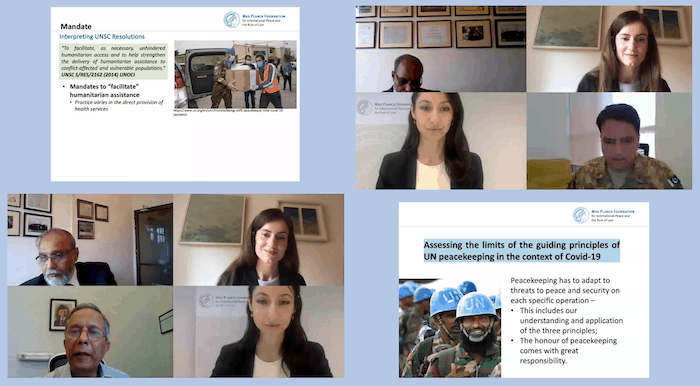The meeting was convened for military officers who are in training at the Department of UN Peacekeeping Training
On 3 September 2020, Research Fellows from the Max Planck Foundation spoke on an Expert Panel held by the Centre for International Peace & Stability (CIPS) at the National University for Science and Technology organised by, and in cooperation with, the Hanns Seidel Foundation, Pakistan. Held via video conference, the event was attended by approximately 40 military officers who are in training to be deployed as UN peacekeepers from Pakistan, Nigeria, the UK, Ghana, Brazil, Bangladesh and Indonesia. This included four female officers.
The event commenced with a welcome from the Associate Dean of CIPS, Professor Tugral Yamin, and opening remarks, from Head of the Department of Peacekeeping Training at CIPS, Brigadier Saleem Beig (Retd) who gave a detailed overview of the training programmes at CIPS and the curriculum relating to international law.
The Foundation’s Research Fellows proceeded to present on international law in relation to UN peacekeeping in the COVID-19 pandemic. The first presentation focused on providing guidance on the potential role of UN peacekeepers in addressing the pandemic in conflict affected States in accordance within their mandate and in light of the varied context they will face. The second presentation focused on assessing the limits of the guiding principles of UN peacekeeping in the context of COVID-19 and any corollary risks to the respective operations. Issues that were discussed included how the consent of the main parties of the conflict, impartiality, and the non-use of force of peacekeeping operations can be interpreted in light of the novel challenges that may arise from the COVID-19 pandemic over the short and medium-term. Practical guidance on the legal framework was shared throughout the presentations to support the Officers following their deployment as UN peacekeepers.
Participants then engaged in an energetic question and answer session with the Research Fellows and Faculty Members of CIPs. Questions focused on issues related to projected challenges for UN peacekeepers in light of the current pandemic, namely reprisals that UN peacekeepers may face due to misinformation about the pandemic, as well as questions on the definition of complex emergencies. Issues relating to how the provision of humanitarian aid may affect neutrality, and how it may be delivered in a severely resource constrained mission were also raised. Participant questions were very practical and pertinent to the topic at hand, which fuelled a very lively exchange between the panellists and the participants.
The event ended with closing remarks from Brigadier Beig, calling on UN peacekeepers to apply the foundational principles to new contexts and stressing the need for UN Security Council resolutions to be clearer and more specific. Finally, he emphasised that each UN peacekeeping mission is delivering to progress to humanity. The project is funded by the Hanns Seidel Foundation, Pakistan and organised in cooperation with the Foundation and National University of Science and Technology.

